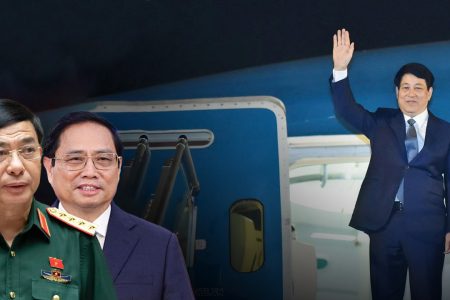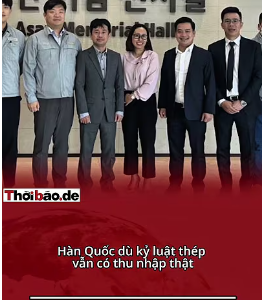
Mr. Vuong Dinh Hue has just been appointed as the Secretary of the Hanoi Party Committee, replacing Mr. Hoang Trung Hai who has stopped his post because of wrongdoing at Thai Nguyen Iron and Steel Company.
There is an opinion that Hue’s promotion is good, because he is considered to be one of the most prominent technocrats with the title of professor among Vietnam’s leaders.
The appointment meeting of Mr. Hue in which Mr. Hai with distressed face
According to observers, whether this is only a temporary position for Hue to become one of the highest four positions of the regime in the 13th National Congress of the party in Jan 2020, or he will remain in this position for one more term to solve the painful issues facing the capital city, the road of the „poor student from Nghe An’s native town to become a deputy prime minister“ is obviously very favorable.
Author David Hutt in The Diplomat (January 16) even stated: Mr. Hue is likely to be the prime minister backed by General Secretary cum President Nguyen Phu Trong before leaving for retirement, in the case that Mr. Nguyen Xuan Phuc will take the seat of General Secretary, in order to maintain the balance of power of the factions.
Mr. Hue also holds a PhD in finance in Slovakia and taught at the Academy of Finance.
It must be said that in previous times, many similar expectations were placed on the shoulders of Nguyen Thien Nhan, Nguyen Van Binh, Vu Duc Dam, Nguyen Manh Hung … and also the characters who unfortunately „fell“ such as Dinh La Thang, Hoang Trung Hai (master of University of Dublin, Ireland) …
Many people have hoped that there will be a new generation of leaders, younger, technocratic, dare to think and do less.

Technocracy is a „trendy“ phrase in Vietnam in recent years, consistent with the policy of building a state of development, a model that has made economic miracles of nations in East Asian countries (Japan, Korea, Taiwan, Singapore).
President of Singapore Halimah Jacob has a doctorate in law, National University of Singapore, and has management experience in labor, trade union, social affairs, women and served as chair of the National Assembly. Singapore is famous for its “technocratic” official model.
This is because technocracy is often defined as a governance system, in which planners will be recruited based on their expertise, especially scientific knowledge in the fields, not have to ask for partisan, faction, relationship or ideology.
This system is quite in contrast with the notion that elected representatives should make government decisions (the democratic model).
The Vietnamese Communist Party often clings to this concept and learn Singapore’s experience to assert that only the Party is capable of leading the country to the ultimate victory, but recently a series of high-ranking officials the Communist Party of Vietnam in turn is prosecuted and has to face many lengthy sentences in prison for corruption and poor management
It must be confirmed to the people that in 2010-2011, there were full of people who did not recognize the true face of the communists. At that time, millions of people, covered by the state’s one-way media, went crazy with Nguyen Ba Thanh, Dinh La Thang and Vuong Dinh Hue, even the PM because of their demonic speech.

That year, during a meeting, Mr. Hue threatened: “If any petrol-selling enterprise sees that the loss is too high, it can stop working. Even Petrolimex, if you cannot, we are ready for dissolution to set up another corporation. As the Minister of Finance, I would like to announce that I will not allow businesses to abandon the circulation of petrol and oil, any difficulties can be solved. Not because of 11 major petroleum importers, but for the economy and more than 80 million gasoline consumers on this territory.” After that statement, many people believed that gasoline prices will no longer be a burden for workers. But in fact, after this statement, the price of gasoline has increased continuously until today, there is no stopping point.
The Communist Party is like an old, worn-out machine. Hanoi Secretary Vuong Dinh Hue may be a modern device. Is there any hope that it will pull the whole machine forward?
Either it will have to adapt or it will be knocked out by the Party’s machine because it is not suitable as the example of Nguyen Ba Thanh or Dinh La Thang
Because if you only rely on some „noticeable“ statements or statements to arbitrarily assign to the contemporary Vietnamese leadership, the word „technocratic“ is a little hasty, it is necessary to look at their specific actions.
Taiwanese President Tsai Ing-wen served as a law professor at Dong Wu University (Soochow) and National University of Politics (Chengchi), and She also holds a doctorate in law from University of Economics (LSE).
Or if they have a ‚technocratic‘ qualification, it must be also behind the ethical criteria of Party members, and especially indispensable certificate of „political theory“ by the Nguyen Ai Quoc Party School, to advance.
For example, Mr. Dinh La Thang, who studied accounting, went up from the Youth Union movement at Song Da Corporation, and also had a PhD with the topic: „Organizing accounting work in construction enterprises with informatics application „(1996).
This is a degree that obviously does not have much application value, but in the end, he was still elevated to the high position in the Communist Party, taking birth and right of Saigon – the biggest economic hubof the country.
This shows more and more about the mind and reach of the leaders who bring the technocrat in Vietnam.
In comparison, late Japanese Prime Minister Ikeda Hayato (1899 – 1965), when he was Minister of Finance, worked hard to research and collaborate with intellectuals to propose strategies to increase national income – in order to bring GDP per capita doubled after 10 years – for the 1960 election platform.
Thanks to his vision and clever steering, Japan actually achieved its goal earlier than expected (it took only 7 years), while Ikeda was not lucky enough to witness that achievement. because he died in 1965.
Or former Taiwanese President Lee Teng-hui
(b. 1923), thanks to his profound knowledge base – trained by both Japan and the United States, graduated with a PhD at Cornell and received the award for the best dissertation of American Agricultural Economic Association (1968).
Mr. Lee Teng-hui contributed greatly to the sustainable development of Taiwan’s agriculture during his time as Minister and after leading Taiwan to transition to democracy.
Despite being a small island with little resources, natural disasters and low starting point with millions of people living in poverty in the 1950s, but after only 30 years, Taiwan took off and turned dragons and democratize successfully.
He led Taiwan and built a constructive government, effectively mobilizing resources into promoting strong economic growth.
Politburo of the 12th Party Congress headed by Mr. Nguyen Phu Trong

In the same way, he should not support the policy of establishing a State Capital Management Committee to control the state-owned firms, the committee he is monitoring and directing.
This is a measure of „hiding dust under the carpet,“ but it is impossible to completely solve the bad debt and the loss situation by „dinosaurs of the juvenile economy,“ the name for the state-owned corporations that should have been equitized or dissolved.
He once stated that the criteria for recruiting this Super Committee’s staff must be clear, self-respect (this standard is quite vague) instead of requiring skilled and experienced people.
Therefore, Mr. Nguyen Hoang Anh, former Secretary of Cao Bang Provincial Party Committee, which has not escaped from poverty and regularly receives central budget aid, was chosen to chair the committee which controls the property up to over $215 billion.
In a system that emphasizes perspectives more than professionalism, tenure thinking, and the spread of illness so badly, there is hardly room for talented technocrats.
Or as commented by researcher Ha Hoang Hop from Singapore, the aftermath of the Dong Tam incident right before the Lunar New Year festival will probably be a difficult test for Hue.
Cat Linh – Ha Dong urban railway is meandering as a poor symbol of governance, showing signs of corruption inside Hanoi capital.
In the case of not being able to become one of the four highest positions of the regime and stay in Hanoi for a whole term, will Mr. Vuong Dinh Hue resolve the urgent problems in Hanoi?
What he will do with the Cat Linh – Ha Dong urban railway project that is constantly behind schedule, causing Vietnamese people to fall into China’s debt trap?
How to improve traffic congestion, air pollution, rivers and lakes, lack of green space, and mess city planning in Hanoi?
Next, with Vietnam’s current policy of mobilizing and rotating high-level personnel, source leaders in the planned area often have less time to engage with the facilities and focus on doing specific long-term things because they are busy in „fighting“ to continue climbing higher.
Therefore, the problem of the country probably lies more in the system error when people are not free to choose really talented people to lead themselves.
Hai Yen from Ha Noi – Thoibao.de (Translated)























